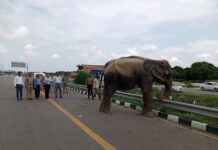(Riya Singh, Intern Journalist): The Election Commission of India on Friday (September 25) announced a series of extraordinary measures for the Bihar Assembly elections, which will be held in the midst of the global coronavirus pandemic. As of Friday, Bihar had a little over 13,000 active cases of novel coronavirus infection. A total of 878 people have died of Covid-19 in the state.
So what steps have the EC taken to ensure that the elections do not result in an uncontrolled spread of the virus in Bihar?
- Fewer voters per booth: Keeping in mind the need for physical distancing, the maximum number of voters per polling station had been reduced from 1,500 to 1,000. This would push up the number of polling stations from the 65,337 that were set up during the previous elections in 2015, to over 1 lakh this time.
- Protective gear: Arrangements have been made for 7 lakh units of hand sanitizers, 46 lakh masks, 6 lakh PPE kits, 6.7 lakh face shields, and 23 lakh single-use gloves.
- Postal ballots: In order to protect vulnerable populations, the facility of “postal ballots” has been extended to all those over the age of 80. The facility has also been extended to those voters who are Covid-positive, and those who have been quarantined due to the infection.
- Special facilities for infected: Besides postal ballots, a special protocol has also been designed for active cases of the disease. These voters would be allowed to vote in the last hour of polling day separately, under the guidance of local health officials.
- Extended timings: To deal with an anticipated slower pace of proceedings, the timings for polling have been extended by an hour. While usually votes are cast between 7 am and 5 pm, polling will now continue until 6 pm at all booths except those categorized as affected by Left Wing Extremism (LWE).
- Rules for candidates: Only 2 people including the candidate, and two vehicles are allowed on nomination day, which under normal circumstances is used as an occasion for a show of strength and support by candidates. Door-to-door campaign parties can have only up to five people including the candidate. Roadshows are allowed, but only with five vehicles.
- Rules for election rallies: “Physical campaigning” has not been barred. On restrictions, if any, on the numbers of people allowed at rallies, the decision would lie with the district administration, and that district collector had already drawn up lists of permitted rally venues. They had been asked to mark the ground to ensure “do gaz ki doori” among participants.
Were these unusual steps unexpected?
Not at all. Most of these steps were part of the guidelines issued by the EC on August 22. It had been announced then that patients and suspected cases would not be deprived of their democratic right to vote; however, they would be allowed to vote only in the “last hour of the poll day”. It was also announced that voters would have to mandatorily wear gloves before touching the electronic voting machine. Temperature check of all voters at the polling station, and wearing of masks would be compulsory on voting day.





